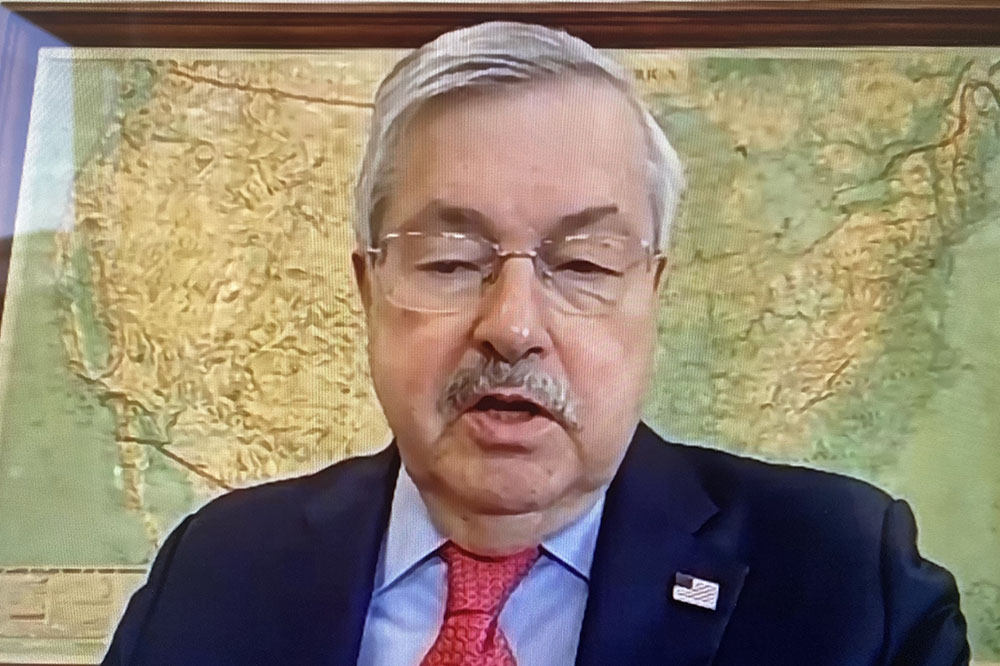
Iowa Soybean Association members learned important information from former U.S. Ambassador to China Terry Branstad’s presentation about U.S. – China relations this week during a live webinar. The former Iowa governor and ambassador to China told participants pressure should be applied to complete other phases. (Photo: Joseph L. Murphy/Iowa Soybean Association)
Former ambassador offers insight into China relations
December 17, 2020 | Bethany Baratta
The signing of the Phase One agreement between the United States and China in early 2020 ceased the tit-for-tat trade war which caught U.S. agriculture in the crosshairs.
Present during the two years of negotiations and the signing of the Phase One agreement was U.S. Ambassador to China Terry Branstad.
“Getting a fair trade relationship, getting reciprocity in trade was something China had promised but failed to deliver on for decades,” said Branstad, who joined two other distinguished guests for a webinar this week hosted by the Iowa Soybean Association.
As a result of the agreement, China increased its purchases of U.S. ag products, including soybeans, and agreed to terms set forth regarding intellectual property, involuntary transfer of technology, and other provisions.
China has made record purchases of soybeans under the agreement, as it also works to rebuild its hog herd decimated by African swine fever. Soybean is the preferred protein source for Chinese farmers, Branstad said, and news of China building one of the largest hog farms in the world bodes well for U.S. soybean demand.
With purchases of soybeans and other ag products underway under the terms of the Phase One agreement, what’s next?
Undoubtedly, China will see what it can get away with under president-elect Joe Biden, Branstad said. So it’s important that the incoming administration take a firm stance in dealings with China, he said.
“This agreement is one of the most significant and comprehensive agreements ever,” said Branstad, who was appointed by then-president-elect Donald Trump as the ambassador. “It was tough and it’s very detailed, but I think it’s critically important to take a strong position and focus on fairness and reciprocity. That’s the question for the next administration: Will they do that? Or will they rely on China’s promises?”
ISA At-Large Director Brent Renner of Klemme said Branstad’s insights into the U.S.-China agreement post-ambassadorship was a terrific opportunity that was missed while trade negotiations were underway.
In conversation with the ambassador, Renner said it was evident that the United States needs to remain strong.
“From his standpoint and his experience, we need to be friendly but firm. We need to continue to keep up the good relationship with them, but make sure they understand we mean business,” Renner said.
Showing a position of strength will help lead both countries through a Phase Two of the agreement, Branstad said.
“There’s no reason to not keep pushing for a Phase Two,” said Morey Hill, ISA District 5 director from Madrid. “We have to keep our foot on Phase One, but we have to keep working on intellectual property, currency manipulation and other terms outlined in the agreement. We’ve got a little leverage now, we can’t lose that.”
Building relationships
Branstad said the relationship between the United States and China—one that the Iowa Soybean Association helped curate—was essential is getting trade restored between the countries. And it’s critical that ISA maintains that relationship.
“As soon as you can get back to personal exchanges and re-establishing personal contacts, the better,” Branstad said. “Many buyers have good feeling about people they’ve worked with, and the Iowa Soybean Association has played a good role in that.”
When normal travel resumes, White said he looks forward to the association meeting one-on-one with customers there.
“We’re a good reliable source and they are a good customer,” White said. “We have to continue to make them aware that we’re here with a sustainable supply of high quality soybeans and we’re driven to deliver that.”
It’s an opportunity also for the Iowa Soybean Association, to continue to push for fair and reciprocal trade with China, Hill said.
“We’re going to have to be very directional in our approach to local, state and national leaders in our messaging as they try to enforce what needs to be done for Iowa and American agriculture, especially soybean growers,” Hill said.
All the while, Hill said building and maintaining trade relationships with other countries are still a priority.
“We want to maintain our relationship with China, but we need to work with other partners,” Hill said. “We do the best at growing anything, and we need all markets.”
Back